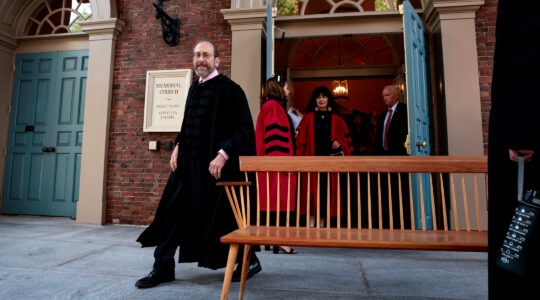(JTA) – An overwhelming majority of American Jews, about 83%, share the same basic demographic profile — but there are signs that American Jewry is growing more diverse.
The 83% is made up of Jews who say they are white and do not identify with ethnic labels such as Hispanic, Sephardic or Mizrahi. They were all born in the same set of places — the United States, Canada and Europe, plus countries of the former Soviet Union — and so were both their parents.
The remainder, an estimated 17%, depart from this profile in at least one regard. These American Jews identify as Black, Asian, some other minority race or multiracial. Also grouped here are Jews of any race who identify as Hispanic, Mizrahi or Sephardic — or anyone born in the rest of the world, including Israel.
Those are among the findings of a report released Tuesday by the Pew Research Center that offers the most detailed information yet on the diversity of American Jews.
Pew found that 17% of American Jews could be considered diverse, but only 8% said they are Black, Hispanic, Asian, other minority races or multiracial. The vast majority, 92%, identified as only white, and an additional 2% identified as white and Hispanic.
There is more diversity among young Jews, suggesting that a shift could be underway in the U.S. Jewish population. According to the new estimate, 15% of Jews under 30 identify as Hispanic, Black, Asian or multiracial.
Read more about what the 2020 Pew study reveals about American Jews.
The extensive survey on race, ethnicity, heritage and immigration is sure to add fuel to an already fraught debate about the demographics of the Jewish community amid efforts to make communal institutions more inclusive.
“People are finally waking up to the fact that our Jewish community is quite multicultural,” Rabbi Angela Buchdahl, who leads a Reform congregation in New York and is Asian American, said in a comment featured in the Pew report.
But while the Pew report has much to say about the topic of diversity, it provides no new estimate for the number of Jews of color. That’s because the survey asked about categories of race and ethnicity in the manner of the U.S. Census Bureau.
As the term “Jew of color” came into common use over the past decade, experts and community leaders have debated what it means and how to estimate the size of the group to which it applies. Some demographers of U.S. Jewry have published estimates of 6%. Others say that 12-15% of American Jews could be defined as Jews of color.
“The Pew study does not resolve the debate,” said Ari Kelman, a Stanford professor and one of the lead authors of a 2019 study that argued that Jews of color are chronically undercounted and suggested the real figure could be as high as 15%.
Kelman’s research, carried out as part of the Jews of Color Field Building Initiative, came amid a push to make the Jewish institution more welcoming to a diversity of Jews. This higher estimate boosted calls to hire more Jews of color, launch education and outreach initiatives, and increase funding for groups like Jewish Multiracial Network and Be’chol Lashon.
The report also contained some questions about the “heritage” of American Jews, finding that two-thirds identify as Ashkenazi. But the findings do not clearly illuminate the background of the other third.
That’s because 25% say they are “just Jewish” or could not be accounted for because some survey respondents refused to answer. And while 4% say they are Mizrahi or Sephardic, these terms may not have captured Jews of Iranian, Syrian and other Middle Eastern backgrounds.
Whether Middle Eastern and Sephardic Jews represent diversity among American Jews the same way that Black Jews do is an entirely different question, according to Mijal Bitton, a scholar who studies Jewish diversity. Some Ashkenazi Jews are not white, while some Sephardic or Mizrahi Jews are white, Bitton said in a comment featured in the Pew report.
“The idea that the Syrian Jews I’ve studied are ‘Jews of color’ would feel overwhelmingly foreign and even ludicrous to them,” Bitton said. “Some might identify as white, some as Middle Eastern, some as non-White – but not as Jews of color.”
To provide another measure of diversity, the survey also asked about immigration, finding that an estimated 90% of Americans were born in the United States. Meanwhile, 10% were born abroad, and an additional 21% have at least one parent who was born abroad. In other words, about a third of U.S. Jews are first- or second-generation immigrants, mostly from Europe or the Soviet Union.
The Pew report found fewer Israelis than many other estimates. Only about 3% of American Jews, or 225,000, were born in Israel or have a parent born there, according to the report.
In past years and decades, surveys of the U.S. Jewish population often didn’t ask about race and ethnicity, making it difficult to estimate change over time. A 2013 report from Pew said that Jews who identify as Hispanic, Black, other nonwhite or mixed make up 6% of the U.S. Jewish population. The current Pew estimate puts the figure at 8%, a little higher, but both estimates are subject to a margin of error.
Still, the new study offers some evidence that the U.S. Jewish community is growing increasingly diverse.
Only 3-4% of U.S. Jews aged 50 and older identify as Hispanic, Black, Asian, other minority races and multiracial. For Jews under 50, the level shoots up to 12-15%.
Diversity at the household level is also significant. An estimated 17% of American Jews live in a home with at least one person who is Hispanic, Black, Asian, multiracial or otherwise not white.
“I am hoping that this new study will take some of the data on Jews of color that is already out there and add to it,” said Jared Jackson, executive director of the advocacy organization Jews in ALL Hues. “Jewish institutions by and large have not held themselves accountable to all Jews in the United States. This will give us a chance to make better decisions as a community.”
JTA has documented Jewish history in real-time for over a century. Keep our journalism strong by joining us in supporting independent, award-winning reporting.






